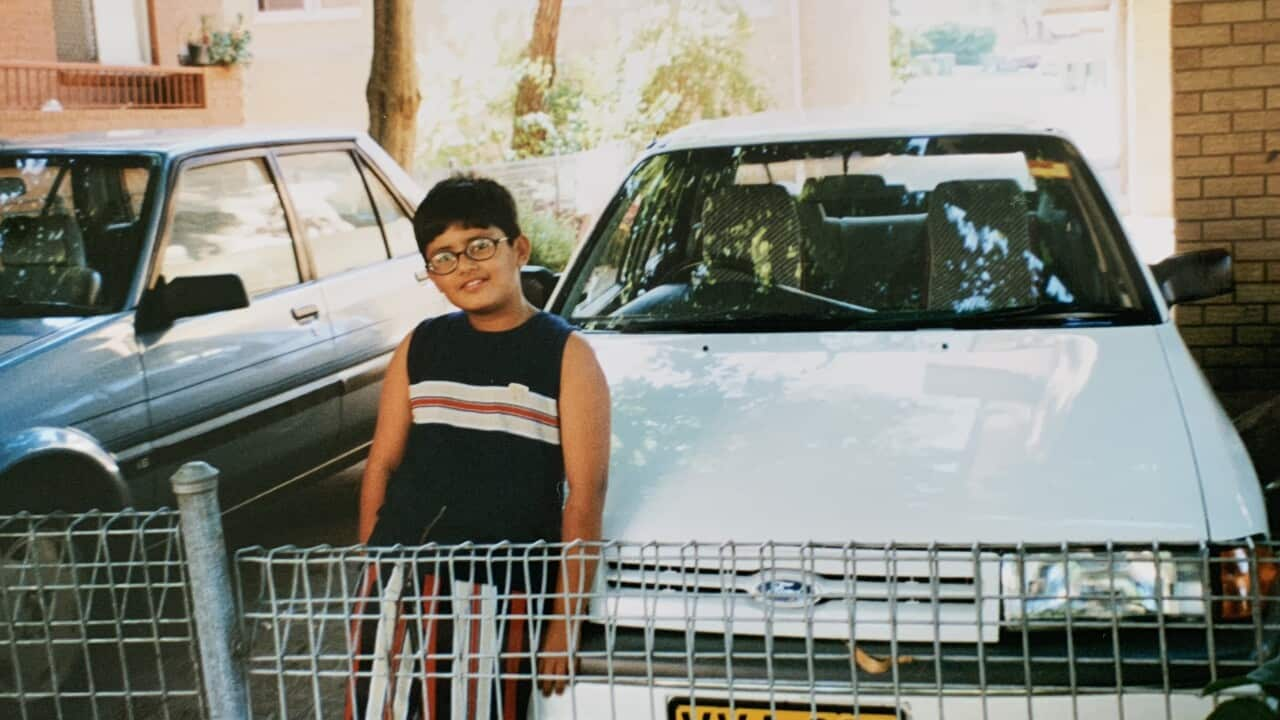As a fresh-faced arrival to Australia aged nine, I tried everything to fit in. But in the process, I turned myself into a middle-aged white man thanks to an unhealthy and unsupervised childhood obsession with conservative talkback radio.
Lacking any real connection to my new home, I plunged myself into this curious, sun-kissed culture by suckling from the all knowing teat of conservative talkback kings, Stan ‘the Man’ Zemanek, John 'Golden Tonsils' Laws and Alan ‘Parrot’ Jones.
Like Homer’s Sirens luring unwitting sailors, these men first entranced me from the tinny speakers in the back seat of Kuljit Uncle’s ‘92 Corolla, the grand chariot on which my parents and I made our entrance into Australian life. It was a hot and muggy day. The back of my thighs stung from the Corolla’s hot pleather. I was pinned under a heavy box of haldi-stained stainless steel pots and Miss Mary, our beloved five-litre pressure cooker. But my mind was completely entranced by the powerful purr of the wise men on the wireless. These were confident, articulate men who knew everything there was to know about being Australian. About being an Aussie battler. An Aussie father. An Aussie patriot. They spoke English and somehow managed to do it without a thick Indian accent. Most impressively, they were always right. Everyone who called in agreed with them. And if you didn’t, they would shout at you until you did. I wanted to wield that sort of power over my new classmates and teacher each time they put on mocking Apu accents and wobbled their heads when speaking to me.
These were confident, articulate men who knew everything there was to know about being Australian. About being an Aussie battler. An Aussie father. An Aussie patriot. They spoke English and somehow managed to do it without a thick Indian accent. Most impressively, they were always right. Everyone who called in agreed with them. And if you didn’t, they would shout at you until you did. I wanted to wield that sort of power over my new classmates and teacher each time they put on mocking Apu accents and wobbled their heads when speaking to me.

Nakul Legha, Highly Commended in the SBS Emerging Writers' Competition Source: Supplied
I had no siblings, no friends or babysitters, and my parents were caught up in a losing game of musical chairs hunting down poorly paid shift work. So I found solace with Jonesy before school, Stan in the evenings, and Lawsie as a treat on holidays when school didn’t clash with his mid-morning shift. What kind of idiot programmed Golden Tonsils during school hours anyway?
For the few who didn’t spend their childhoods listening to talkback radio, these men were demagogues speaking to and from the heart of middle Australia. Like all battlers, they earned millions speaking up for the working class, had a direct line to those in power and brought in rivers of gold in advertising revenue for their stations.
The formula was a rich diet of creative insults and outrage over the ills of multiculturalism, Indigenous Australians, gay rights, welfare recipients and the general state of Australia. Throw in some Slim Dusty bush ballads, regular male callers who pretended to be women because it was a very novel and funny concept, and you had a perfect microcosm of modern Australia ripe to be plucked and studied by a chubby Indian boy with a bowl cut.
My lasting obsession was with Stan. I spent weeknights after school unwinding with Stan, curled up on the balcony of our tiny apartment, where the reception was better, holding the portable radio in one hand and a cold glass of Milo in the other.
Stan’s grudges soon became my grudges. I followed the radio ratings closely (‘Number 1 in three metro markets again, yes!’). I was shocked when Jonesy defected to a rival station and would go head to head with our beloved station. I relished Stan’s rivalry with fellow broadcaster Mike Carlton who was, in Stan’s eloquent words, ‘a turd’. Like every kid, I picked sides and chose favourites. Ford vs Holden. Warney vs Murali. 2UE vs 2GB. Stan vs Mike. Lawsie vs Jones.
When people asked my nationality, I was sure to proclaim that I was 'Australian-Indian'. Stan was obsessed with testing the national allegiance of his ethnic callers and made a point of telling the Abduls, Tans or Kims who called in that the Australian always came before the hyphen. I shook my head in dismay when Mohammed from Campsie called in one night and said he was Lebanese-Australian. ‘That’s not how you speak to Stan,’ I whispered to myself, swirling my Milo.
I bought a comically large Australian flag to hang proudly in my bedroom next to the much smaller Indian flag. I became that guy, wearing the Aussie flag as a cape at every sports event and public gathering, desperate to show off my dinky di bona fides.
When my parents started having doubts about the Australian experiment - something about no money, no jobs, no prospects - I agreed to move back to India on one condition: that they buy me every single one of the more than 100 albums released by Slim Dusty over his career. We didn’t move back. I can only assume the deciding factor was the prospect of further financial ruin at the hands of Australia’s most beloved and industrious country music artist.
Some kids dreamed of playing cricket for Australia while I fantasised about being a featured caller on Stan's show. Instead of doing homework, I spent hours hogging the home phone, stuck on hold trying to get through to Stan. I had my intro sorted: 'Hi Stan, yes, it's Nakul from Parramatta. I'm Australian-Indian and I love your show. That’s right, I’m only 10 years old! Your youngest listener? Haha you bet. You know, I was thinking about what you said on dole bludgers getting disability pensions and...'
I’m not sure what I was really thinking about dole bludgers on disability. I’m not sure I was even the intended audience for diatribes about welfare cheats, capital punishment or the way things were. But it didn’t matter. I just wanted so badly to be, to feel and to be seen as Australian. And these were the first voices to tell me definitively how I could do that.
It turned out Stan didn’t much like immigrants. Not many of my talkback heroes did. In fact, Stan was an advocate for a total ban on immigration while any Australian remained unemployed. In his ideal world, my parents and our pressure cooker would have been turned back at border control.
Would he have liked me if I’d gotten through to the show? Would he have approved of me?
I think so. I was different from the others. I made an effort. I did everything right. I was a patriot and I demanded patriotic perfection from those around me. Though I was fluent, I increasingly avoided speaking Hindi in public. I stopped going to the temple. I was embarrassed when mum wore a salwaar kameez to Parra Westfield and I sure as hell let her know. I impatiently corrected dad’s pronunciation when he offered to make Wedgie Mite on toast for breakfast or take us to Pijja Hut for dinner.
I made sure that the red, white and blue of the Union Jack was always visible in front of the saffron, green and white of the Indian flag.
I never had Anglo friends over to our place, sparing them the stink of masala, the burden of eating our food with their delicate porcelain hands and making stilted small talk with my parents. I distanced myself from my Indian friends because they were so painfully rooted in the past, to the old culture, to those outdated traditions.
Instead, I filled up the empty vessel of my new cultural identity from a high pressure hose of scummy nationalism. Once that vessel was full to the brim, I stuck the open end of the hose down my throat and gulped down Australia until I belched and bloated and pissed myself. Red, white and blue.
Nakul Legha is Highly Commended in the 2020 SBS Emerging Writers' Competition.
Nakul was born in India and grew up in Bhutan, where television was banned. Now, he's making up for lost time by spending most of his days watching and working in television. He’s passionate about hearing and telling new kinds of Australian stories, and can be found loitering around the Netflix Australia offices helping to make this happen. He has previously worked as a media lawyer and for the ABC (where he got to be B1 from the Bananas in Pyjamas for one day).
is on sale July 28. The featured writers include: Alana Hicks, Nadia Johansen, Amy Duong, Nakul Legha, Karla Hart, Sita Walker, Jason Phu, Trent Wallace, Tania Ogier, Miranda Jakich, Bon-Wai Chou, Prateeti Sabhlok, Amer Etri, Cher Coad, Sam Price, Rosie Ofori Ward, Lal Perera, Monikka Eliah, Serpil Senelmis, Margarita D'heureux, Maha Sidaoui, Kaye Cooper, Esmé James, Naeun Kim, Jackie Bailey, Michael Sun, Caitlyn Davies-Plummer, Hugh Jorgensen, Dianne Ussher, and Courtney Theseira.




